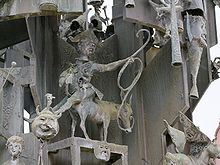Bazoche

Bazoche , also: Basoche , was a guild of court clerks (lawyers' assistants: Les clercs de la bazoche) in France , which resided in one of the royal palaces in Paris . The beginnings of the guild go back well into the Middle Ages, its history essentially ends in the French Revolution with a decree of February 13, 1791.
The Bazoche became famous not least because it used a royal privilege granted to it in 1303 to carry out religious performances, in order to bring mostly satirical plays to the stage every year .
In today's French , Basoche is a pejorative term for right-hand traffic as a whole.
background
Based on the King Philip III. Granted the privilege to perform sacred plays, the Bazoche developed its own allegorical genre of moral games, the Moralités . Later sottias and farces were also performed. A particularly outstanding farce is the (comical) process Pathelin (first performed in 1480). In this play, society made fun of the weaknesses of its own state. The satirical hustle and bustle resulted in a series of prohibitions, culminating in the lifting of the permission to give dramatic representations in 1540. During the reign of Louis XII. the Bazoche had its heyday: Although not spared from satire, Ludwig XII. the Bazoche even set up its stage on the famous table de marbre in the Palace of Justice in 1500 .
See also
literature
- Fabre, Les clercs du Palais. Études historiques sur les Bazoches. 2nd edition, Paris 1875
- Konrad Fuchs / Heribert Raab: Dictionary of History. Vol. 1, dtv, Munich 1985
- M. Monnier, Les aieux de Figaro, Paris 1868